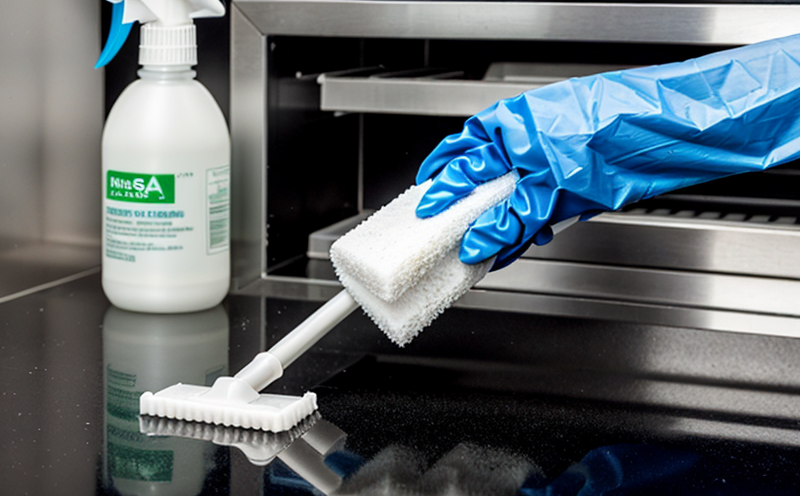DIN EN 13624 Fungicidal Activity Testing of Plastic Hygiene Products
The DIN EN 13624 standard specifies a method for determining the fungicidal activity of plastic hygiene products. This test is critical in ensuring that plastic items used in environments where hygiene and sanitation are paramount, such as healthcare facilities or food preparation areas, effectively inhibit fungal growth.
Understanding the significance of this test requires delving into its technical aspects. The standard outlines a procedure to assess how well a given plastic material can prevent fungi from growing on it under controlled conditions. Fungi, like mold and mildew, thrive in humid environments, making plastic hygiene products susceptible to contamination if not properly treated or formulated.
The test involves exposing the plastic sample to fungal inoculum for a specified period. After incubation, the specimens are visually inspected and compared against control samples. The standard defines specific parameters for both the exposure conditions and the evaluation criteria to ensure consistency across different laboratories.
One of the key challenges in conducting this test is ensuring that the plastic material does not interfere with the fungal growth assessment. This requires careful selection of the plastic type, thickness, and surface finish. The specimen preparation process is critical; it involves cutting the sample into standard-sized pieces, which are then sterilized before inoculation.
The testing apparatus used in this procedure includes a humidity chamber to maintain controlled conditions throughout the test. This ensures that the environmental variables do not affect the outcome of the fungicidal activity assessment. The fungal inoculum should be standardized and consistent for all tests, typically using a specific strain of fungi approved by the standard.
The results are reported as the percentage reduction in fungal growth on the treated plastic compared to untreated control samples. This quantitative measure provides clear evidence of the fungicidal efficacy of the plastic material. The test is particularly relevant for products like hospital gowns, reusable medical devices, and food packaging materials that come into contact with potentially harmful microorganisms.
The importance of this testing cannot be overstated, especially in sectors where hygiene and safety are critical. By ensuring that plastic hygiene products meet the stringent requirements outlined in DIN EN 13624, manufacturers can guarantee that their products effectively prevent fungal contamination, thereby enhancing public health and safety.
- Specimens must be cut to standard dimensions for accurate testing.
- The humidity chamber maintains controlled conditions throughout the test.
- Fungal inoculum is standardized to ensure consistent results across tests.
- The percentage reduction in fungal growth on treated samples is reported.
Why It Matters
In environments where hygiene and sanitation are paramount, such as healthcare facilities or food preparation areas, the presence of fungi can pose significant health risks. Fungi like mold and mildew thrive in humid conditions, making plastic products susceptible to contamination if not properly treated.
The DIN EN 13624 test is essential for ensuring that plastic hygiene products effectively inhibit fungal growth. This standard provides a methodical approach to assessing the fungicidal activity of these materials, thereby enhancing public health and safety. By adhering to this testing protocol, manufacturers can ensure that their products meet stringent hygiene standards, reducing the risk of fungal contamination.
The test results are particularly critical for healthcare facilities where exposure to fungi can lead to infections or exacerbate existing conditions. For food packaging materials, preventing fungal growth is essential to maintain product quality and safety. The standard also plays a crucial role in ensuring that reusable medical devices remain hygienic between uses.
The importance of this test extends beyond just the plastic hygiene products themselves. It also influences the design and formulation processes for these items, encouraging innovation in materials science to develop more effective anti-fungal treatments. By incorporating DIN EN 13624 into their quality control procedures, manufacturers can ensure that their products meet the highest standards of hygiene and safety.
The test's relevance is not limited to just plastic products; it also has implications for other materials used in similar applications. The principles behind this standard can be applied to a wide range of products, from textiles to medical devices, ensuring that they effectively inhibit fungal growth under controlled conditions.
Benefits
The benefits of DIN EN 13624 fungicidal activity testing extend beyond just meeting regulatory requirements. By incorporating this test into their quality control procedures, manufacturers can gain several advantages:
- Enhanced Product Quality: Ensures that the plastic hygiene products meet stringent hygiene standards.
- Innovation in Materials Science: Encourages the development of more effective anti-fungal treatments for various materials.
- Improved Public Health and Safety: Reduces the risk of fungal contamination, particularly in healthcare facilities and food preparation areas.
- Increased Consumer Confidence: Builds trust among consumers who value hygiene and safety when using plastic products.
The test also provides valuable data for R&D engineers to refine their formulations. This ensures that the materials used in these products are not only effective but also safe and biocompatible with human contact. By adhering to this standard, manufacturers can ensure long-term success by staying ahead of regulatory changes and consumer expectations.
Why Choose This Test
- Compliance with International Standards: DIN EN 13624 is an internationally recognized standard, ensuring that the test results are widely accepted and understood.
- Consistent Results Across Laboratories: The standardized procedure ensures consistent testing outcomes, making it easier to compare data across different facilities.
- Advanced Testing Equipment: Utilizes advanced humidity chambers and standardized fungal inoculum for precise results.
- Data-Driven Decision Making: Provides quantitative measures of fungicidal activity, enabling informed decision-making in product development.





